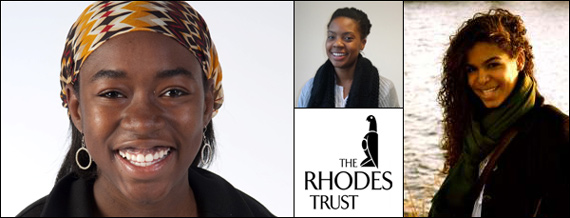The Rhodes Scholarships, considered by many to be the most prestigious awards given to U.S. college students, were created in 1902 by the will of Cecil Rhodes, an industrialist who made a vast fortune in colonial Africa. Each year, 32 Americans are named Rhodes Scholars. The scholarships provide funds for two or three years of graduate study at Oxford University in Britain. Rhodes Scholars from the United States join students from 14 other jurisdictions including Australia, southern Africa, Kenya, India, and Canada. All told, about 80 Rhodes Scholars worldwide are selected each year for study at Oxford.
This year, 1,700 American students sought Rhodes Scholarships. Of those, 838 were endorsed for selection by 302 different colleges and universities. Of the 32 American winners this year, six attend Harvard University and seven have been students at Yale University.
In 1907 Alain LeRoy Locke, later a major philosopher and literary figure of the Harlem Renaissance, was selected as a Rhodes Scholar to study at Oxford University. It is generally believed that at the time of the award the Rhodes committee did not know that Locke was Black until after he had been chosen. It would be more than 50 years later, in 1962, that an African American would be named a Rhodes Scholar. That year John Edgar Wideman, now a famed author as well as a professor at Brown University, was selected. Other African Americans who have won Rhodes Scholarships include Randall Kennedy of Harvard Law School, Kurt Schmoke, former mayor of Baltimore and now dean of the law school at Howard University, and Franklin D. Raines, former director of the Office of Management and Budget and former CEO of Fannie Mae.
In 1978 Karen Stevenson of the University of North Carolina at Chapel Hill was the first African-American woman selected as a Rhodes Scholar. This year, three African American women were among the this year’s group of Rhodes Scholars.

Joy A. Buolamwini is a graduate of the Georgia Institute of Technology, where she majored in computer science. She is currently working at the Carter Center in Atlanta. She has founded or co-founded three businesses. She plans on a degree in African studies at Oxford.
Rhiana E. Gunn-Wright is a 2011 graduate of Yale University. She holds a bachelor’s degree in African American studies and women’s, gender, and sexuality studies. She has been working at Women’s Policy Research in Washington, D.C. Her plan is to obtain a master’s degree in comparative social policy at Oxford.
Nina M. Yancy is a senior at Harvard University where she majors in social studies. Yancy grew up in the Dallas area but her family recently moved to Chicago. Yancy has had internships at CNN, the Center for American Political Studies and in the British House of Commons. She is a member of the Harvard Ballet Company. She plans on pursuing a master’s degree in global health science as a Rhodes Scholar.










Congrats Ladies!!! A job well done!! Much success in your future endeavors!!
Susan Rice, the current U.N. Ambassador, is also a Rhodes Scholar. She received both her Masters and Doctorate from Oxford.
Congratulations. May success be yours.
So very proud of each of you. We place such news in the “Now Ain’t That Good News File!” YEAH !!!
Congratulation Ladies